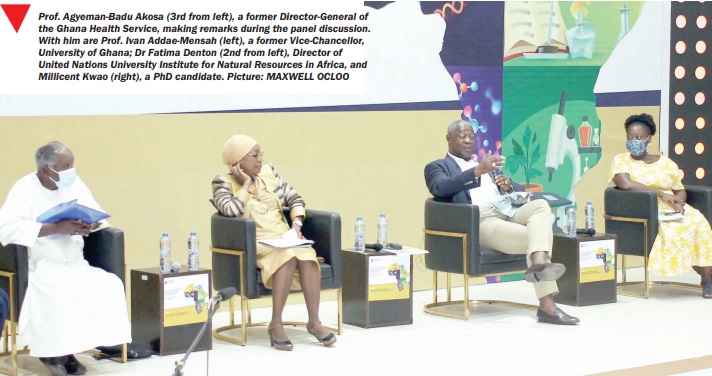
Ban single-use plastics — Prof. Akosa
Ban single-use plastics in the country, a former Director-General of the Ghana Health Service (GHS), Prof. Agyeman-Badu Akosa, has said.
He said this would help reduce the danger posed by plastic waste which has life-threatening implications on human life and the environment.
Prof. Akosa was speaking at a high-level panel discussion at the University of Ghana’s Day of Scientific Renaissance of Africa in Accra last Thursday.
Hosted by Bernard Avle, speakers included the former Vice-Chancellor of the university, Prof. Ivan Addae-Mensah, and the Director of the UN University Institute for Natural Resources in Africa, Dr Fatima Denton.
Production of plastics
Prof. Akosa said humans produced over 8 billion tons of plastic which were now used for various purposes including the manufacture of clothing, curtains and carpets, among others, due to its low cost of production.
“The oceans today virtually contain 10 per cent of all the plastic produced in this world,” he added.
According to Prof. Akosa, “plastics when leached into the atmosphere as a result of its improper disposal, cause bronchitis, asthma and pulmonary cancers when breathed in”.
He also said that the use of plastics disrupted the hormones of men and women where the plastic acted as anti-androgens, thus, affecting the production of sperms resulting in infertility, and in most cases, birth defects.
Prof. Akosa, therefore, warned that “if we as a country are not prepared to deal with the plastic menace, the consequences could be great“.
National development
For his part, Prof. Addae-Mensah said that universities were important in national development for which reason higher education must not be considered as a luxury but a necessity to spur growth.
“These problems — challenges of poverty, diseases, industrialisation, socio-economic and manpower development all depend on a determined effort to inculcate science, technology and innovation in our economic and social life,” he said.
Dr Denton also said that sustaining Africa’s development would hinge on adopting principles that ensured a circular economy.
“The principles are to rethink, reduce, reuse, redesign and recycle. These will allow us to come out of a vicious cycle of linearity to a circular economy,” she added.
Recommendation
In a presentation on local alternatives to the packaging of food in plastic, Prof. Kwesi Salia, who sat in for a former Dean of the UG, Prof. Kofi Sefa-Dedeh, recommended that funds must be released for research into the development of materials or receptacles that could easily be modified into bio-degradables which he said were less harmful to humans and the environment.
“Intensive education should be done to create awareness for people to understand the danger involved in the use of plastics. It will also inform policymakers on the need to ban the use of these harmful materials in our societies,” he added.
